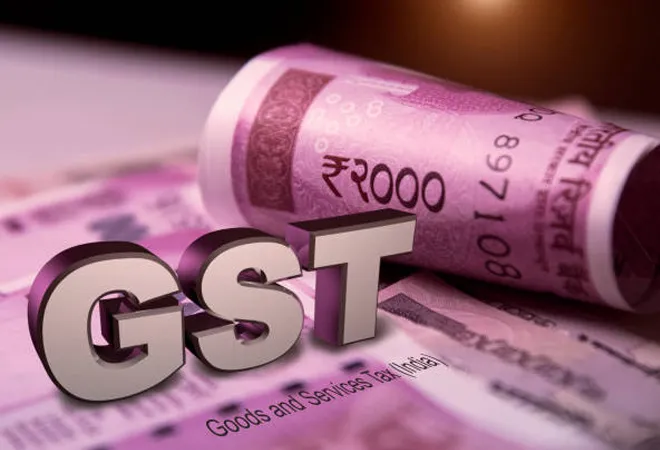
The implementation of the Goods and Services Tax (GST) by the Central government in July 2017 was
touted as a transformational reform to unify tax administration in India. In a rare moment of federal cooperation, states cutting across party lines supported the Centre’s move on GST, which facilitated the ushering of the reform. Five years have passed since then and the GST regime has exhibited both strengths and weaknesses that have had a strong bearing on India’s fiscal federalism.
Federal cooperation
The implementation of the GST captured the spirit of federal cooperation despite persisting political distrust and differences between the centre and states. All the states willingly
ceded most of their taxation powers and consented to surrender the exiting multiple imposts that got accommodated within the GST regime. As a result, many entries in the State List under Schedule 7 of the Constitution were in-effectuated and the State legislative assemblies could no longer legislate on issues such as the sale and purchase of goods with few exceptions like petroleum and liquor. As it has been mandated by the GST Act, 2017, the states were supposed to receive the State GST (SGST) and a section of Integrated GST ( IGST). Apart from that, it was acknowledged that the process of transition in the new indirect taxes regime could result in revenue shortfalls for the states and so it was unanimously decided that the losses incurred by the states will be compensated from a pooled GST compensation fund for first five years, the period that ended in June this year.
All the states willingly ceded most of their taxation powers and consented to surrender the exiting multiple imposts that got accommodated within the GST regime.
Moreover, by 279A of the GST Act, a GST Council comprising of Union Finance Minister, the Union Minister of State for Finance, and Ministers of Finance from every state government was formed as a body (named GST Council) which was supposed to collectively give recommendations to the Centre and the states on issues such as the rate of taxes to be levied, model GST law, and regarding the goods and services to be brought under the purview of the GST. So, the fructification of the GST reform has been strongly premised upon the fundamental imperative of federal cooperation and dialogue both about resource distribution as well as in terms of decision-making.
Growing federal fault lines
Despite the initial moment of unanimity and optimism amongst the Centre and the states on GST’s transformative potential, there are growing fissures and mistrust on issues of GST compensation and the decision-making structure of the GST Council. The issue of pending GST compensation to the states surfaced gradually in 2019
due to economic slowdown but got
largely aggravated during the COVID-19 crisis. During the peak of the pandemic, on one hand, the health crisis-induced economic slowdown severely dented the revenue of the states. On the other hand, it was the state governments who were primarily posited to face the ground-level challenges of the COVID-19 mayhem. In such a situation of tremendous exigency, federal contention over the laggard supply of GST compensation by the Centre to the states came to the forefront. Many Opposition-ruled states
accused the Centre of not providing them with their dues that have been seriously undermining their efforts to combat the health crisis and initiate a plan for post-pandemic economic recovery. Rather during the pandemic, the Centre recommended the states two options of borrowing to compensate for the GST revenue shortfalls that further
triggered protests from states as they claimed that the Centre was compelling them to take loans instead of providing giving them the promised revenue.
The issue of pending GST compensation to the states surfaced gradually in 2019 due to economic slowdown but got largely aggravated during the COVID-19 crisis.
However, as the pandemic crisis subsided and there have been some signs of economic recovery, at the end of May this year, the Centre
informed that it has cleared all dues of GST compensation to the states. Though the five-year period for GST compensation ended recently, many states are urging the Centre to extend it for another five years for ensuring a buoyant post-pandemic economic recovery of the states. However, the Centre said that no more compensation will be required by the states as the GST revenue collection for states has been very robust. Hence, the issue of GST compensation might snowball into another episode of federal conflict in the time to come.
Further, the decision-making process of the GST Council is
seen by Opposition-ruled states to be dominated by the Centre. As the Council has one-third of the voting power out of 33 votes, 22 votes are shared by 31 states and Union Territories (UTs), with each state or UT having a vote of 0.709. Any decision of the GST Council requires a three-fourth majority or a minimum of 25 votes. Also, the Centre holds a sort of veto as it holds one-third of the total votes. Moreover, with the BJP-led National Democratic Alliance ruling in most states, the Opposition-ruled states
feared the Centre’s domination in the decision-making structure of the GST Council. Recently, the Supreme Court observed in the
Union of India vs Mohit Minerals case that the GST Council recommendations are not binding on the states and the states can exercise their independent power to legislate on GST under Article 246A of the 101
st Constitutional Amendment Act.
Many states are urging the Centre to extend it for another five years for ensuring a buoyant post-pandemic economic recovery of the states.
Conclusion
The survival and growth of federalism are premised upon a healthy environment for negotiation and discussion, especially in a deeply diverse polity like India. Despite the prevalence of deep political divide and partisan mistrust, efforts must be undertaken to minimise the differences and discords by building consensus on crucial matters of governance. The GST reform which was largely possible through grand federal bargains and negotiations is one such crucial area that requires a more consultative and consensus-building framework to deepen fiscal federalism in particular. As India completes the crucial landmark of five years of GST reform, a more open and robust consultative approach between the Centre and the states, especially on issues of resource distribution and decision-making can push the GST reform forward. Finally, with veto-making power at its disposal, the Centre carries greater responsibility to strengthen the federal momentum.
The views expressed above belong to the author(s). ORF research and analyses now available on Telegram! Click here to access our curated content — blogs, longforms and interviews.



 The implementation of the Goods and Services Tax (GST) by the Central government in July 2017 was
The implementation of the Goods and Services Tax (GST) by the Central government in July 2017 was  PREV
PREV


